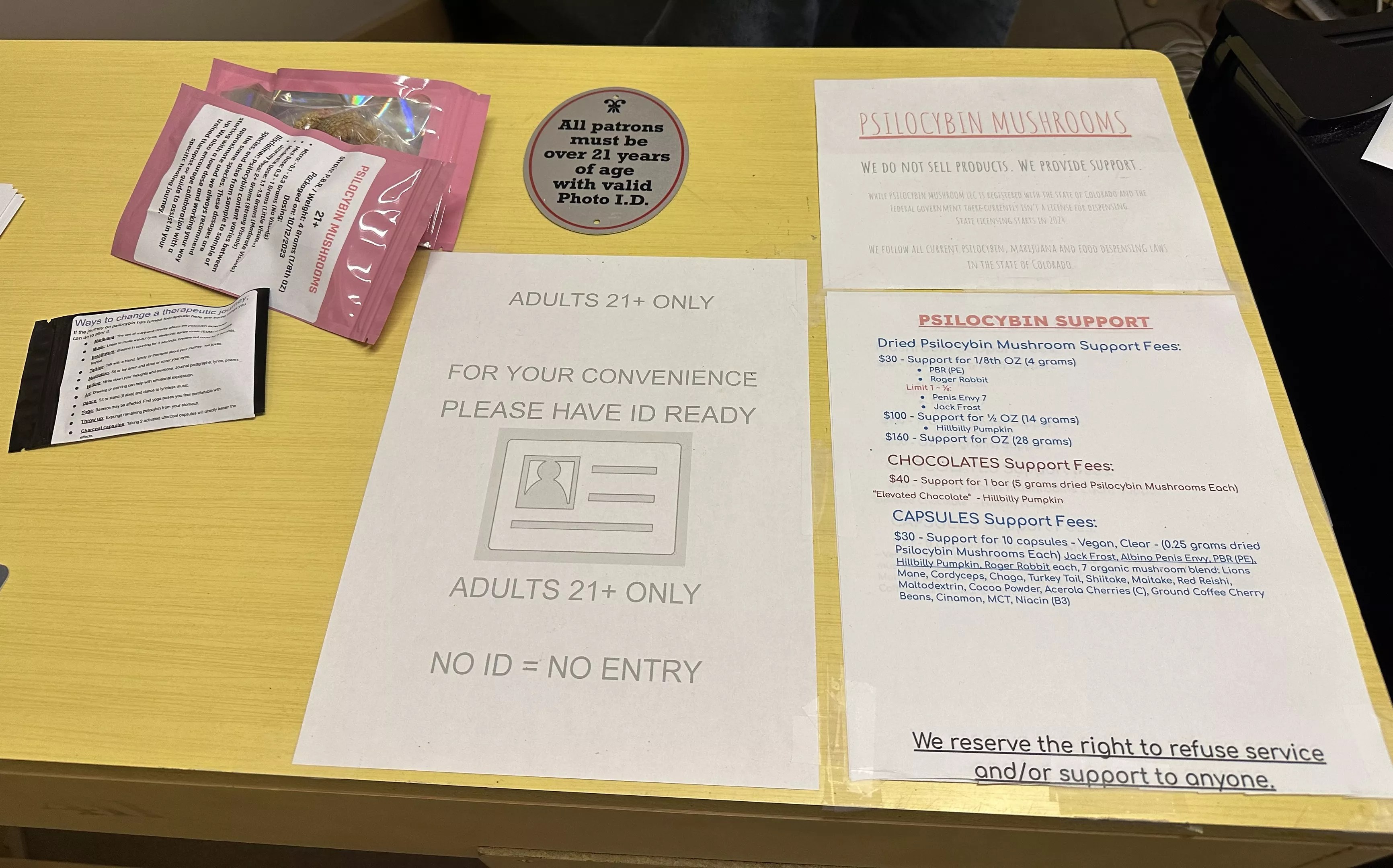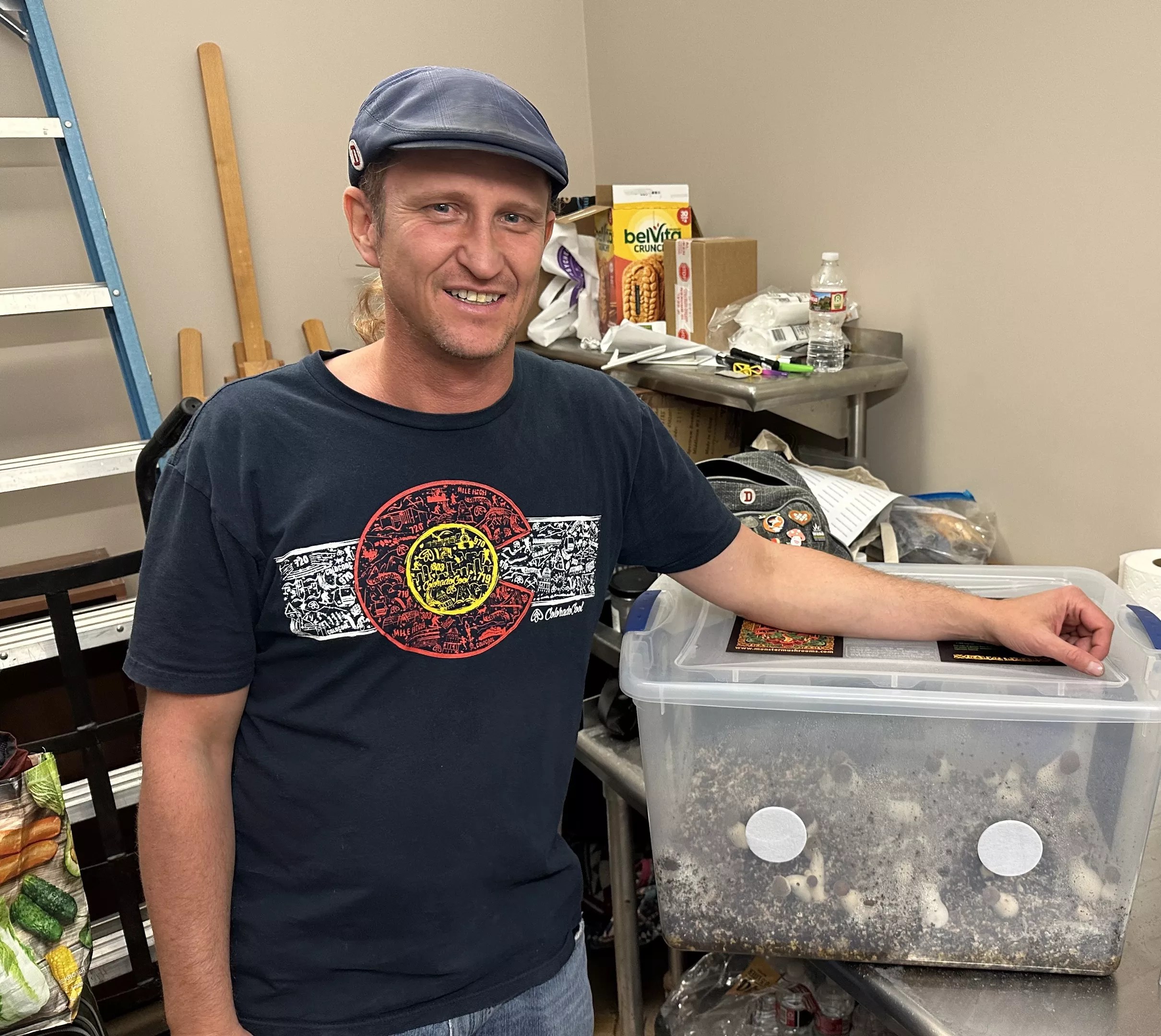
Thomas Mitchell

Audio By Carbonatix
“This one, here, PBR, is better for visuals. These are Penis Envy. That’s a good mix for both visuals and feelings.”
Darren Lyman is going over the various psychedelic mushrooms available at his magic mushroom co-op. Located in a small studio at 800 West Eighth Avenue, just off Santa Fe Drive, Lyman’s office serves as a support center for those in need of natural medicine, he says. After calling ahead, you can walk in, show your ID (21 and over only), and then sit down for a visit.
His support includes a chat about the intoxicating effects of psilocybin mushrooms; psilocybin’s potential to help treat mental ailments such as anxiety, addiction, depression and traumatic stress; and your intended use for the mushrooms. That session typically costs $30. And the four grams of blue-streaked Penis Envy mushrooms? Well, those are free.
For $10 more per session, his support includes a free bar of chocolate infused with five grams of mushrooms instead. For $160, that support comes with an ounce.
“It’s just like how co-op cannabis dispensaries started in California in the ’90s,” Lyman explains. “They tell me their reasons, and I provide the support.”
According to Lyman, he’s operating legally under Colorado’s new Natural Medicine Health Act, or Proposition 122, the initiative approved by Colorado voters in November 2022 that decriminalized certain psychedelics and legalized medical psilocybin. Under the new laws initiated in response to 122, adults can now cultivate, possess and share psilocybin mushrooms, plants with DMT and mescaline (except for peyote), and cultivate and possess (but not share) ibogaine.
Lyman insists that he’s selling services such as his advice, self-authored informational pamphlets about psilocybin use, and activated charcoal capsules – a common way of reducing body absorption of psilocybin when someone has bitten off too much – and not the psilocybin itself. That, he stresses, is free.
“We don’t sell products,” Lyman says. “It’s a co-op. People create their own recipes, and we can implement them into what we do here.”
Prop 122’s proponents repeatedly stated that the measure would not create a retail aspect for psychedelics, and state regulators have echoed that message. Psilocybin edibles and natural extraction methods will likely be allowed under Colorado’s upcoming medical psilocybin guidelines, but only for use in licensed, supervised settings, according to state officials.
The Natural Medicine Health Act and a bill passed in the state legislature intended to tighten up its language created cultivation limits and guidelines, but didn’t create any possession limits. Applications for psilocybin production facilities and supervised use sites are expected to be available next year, but operators of such businesses must first be licensed by the Department of Regulatory Agencies (DORA) and the Department of Revenue’s new Natural Medicine Division (NMD).
So what makes Lyman so confident? Although both Prop 122 and resulting laws allow for commercial psilocybin use to take place only under supervision, Lyman argues that his co-op isn’t trying to be a supervised use site. Nor is it a retail outlet, he says.
“It’s a dual-zoned property, so it’s a private space, also,” he says. “Until more restrictions are passed [by lawmakers], this is the same as marijuana was.”
Lyman operates openly, advertising in Westword and other outlets; his phone, whose number is included on the ads, receives around three to five calls per day. About twenty people are now members of the co-op, he says, adding that most are seeking support and mushrooms for various mental ailments, such as alcohol addiction and depression.
Lyman eventually wants to add a small commercial kitchen and cultivation area to the studio where other mushroom growers and edibles makers can operate.

Darren Lyman is one of Colorado’s first magic mushroom co-op founders, but he doesn’t view the move as risky.
Thomas Mitchell
Although he’s not alone in comparing his operation to the early days of cannabis – the entire NMD is staffed by cannabis regulators, and many rulemaking committee members hail from the pot industry – his path ahead could be bumpy.
Early medical marijuana dispensaries routinely dealt with local, state and federal law enforcement raids and penalties before the U. S. Department of Justice issued a legal memo in 2009 arguing on behalf of tolerating state-legal cannabis businesses. Even that didn’t stop run-ins with the law, both deserved and undeserved, for dispensary operators, though. Colorado law enforcement agencies have cracked down in the past on cannabis operations using similar claims of providing free products for monetary donations, as well.
Like much of Colorado’s natural medicine community, however, Lyman is currently operating in a decriminalized space, which carries less oversight than a regulated commercial industry. This is an important distinction until future laws say otherwise, he notes.
So far, he hasn’t heard any objections from the government. According to NMD executive director Dominique Mendiola, the state anticipates “certain challenges” and activities “we need to keep an eye on or intervene” in, but community outreach and education are preferred. Mendiola, who’s spent the better part of a decade regulating Colorado cannabis, says the NMD would rather “not go at it with an enforcement-first approach.”
“We lead with education and see where we can support an effective transition of folks who are engaging in some of these areas and where there’s an interest to be a part of the regulatory space of this new program,” Mendiola explains. “Then there is seeing where we can support and facilitate that process, but also keeping an eye out for more clarity in the law and where can we have a role in informing that by making suggestions to the General Assembly for clarity that’s needed to address certain activity that we see and believe may not be intended.”
Lyman, who’s currently moving full steam ahead on the buildout of his co-op, believes that regulators will be coming to him for advice on rulemaking and regulation drafting in the future. He doesn’t see his psilocybin services as a risk, he says, but as a golden-capped opportunity. Once licenses and permits are available at the state and local levels, he will apply for them, he adds, with hopes that the NMD will eventually create a “support center license” for outfits like his.
“Most law enforcement action in these situations ends with lawsuits against the city. I’m operating within the law, and I’m not violating anything,” he says. “I think, eventually, the state will pattern what they do after me.”
Lyman, 43, is new to psychedelics, having become interested while dabbling in CBD and THC production for his father, who was diagnosed in the mid-2010s with multiple sclerosis. While attending a University of Denver certification course for cannabis work in 2021, Lyman started researching psilocybin. He’s now a licensed medical marijuana caregiver and says he would like to launch a CBD edibles business one day, but right now wants to focus on his mushroom goals.
When asked about his bold business move and relatively recent entrance into Colorado’s psychedelics space, Lyman admits he is “young at this,” but is “willing to learn from anyone.” Although he’s been criticized by organizations such as BIPOC Psychedelic, a group of psychedelic proponents, for launching what they believe is a gray-market business for profit, Lyman insists he’s in the mushroom trade for the long haul, and wants to continue doing this “even if I don’t make any money,” he says.
“I look forward to working with future facilitators on individual projects, from microdosing to five-plus grams,” he concludes. “I’m excited to help heal the community physically, mentally and emotionally.”